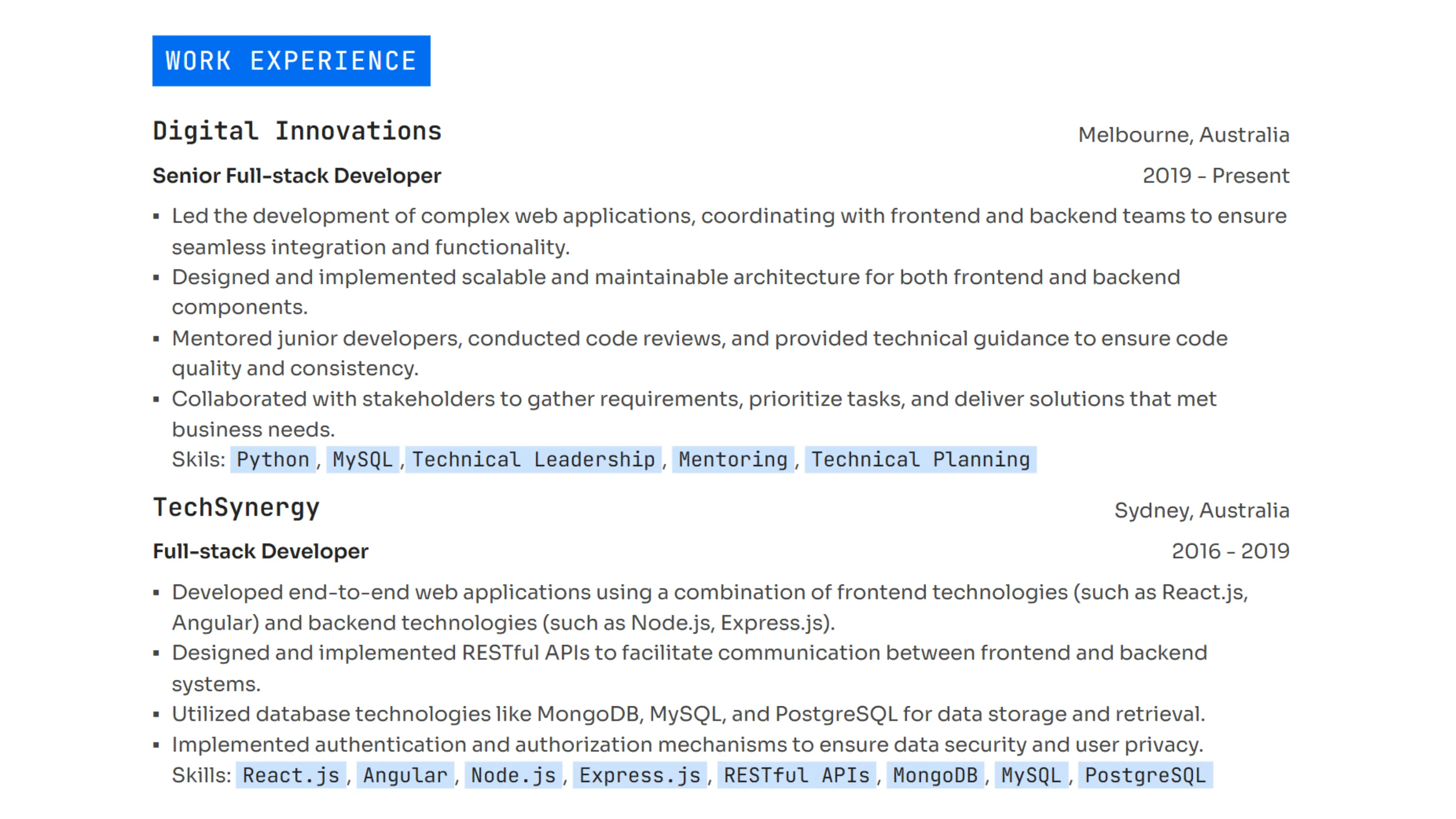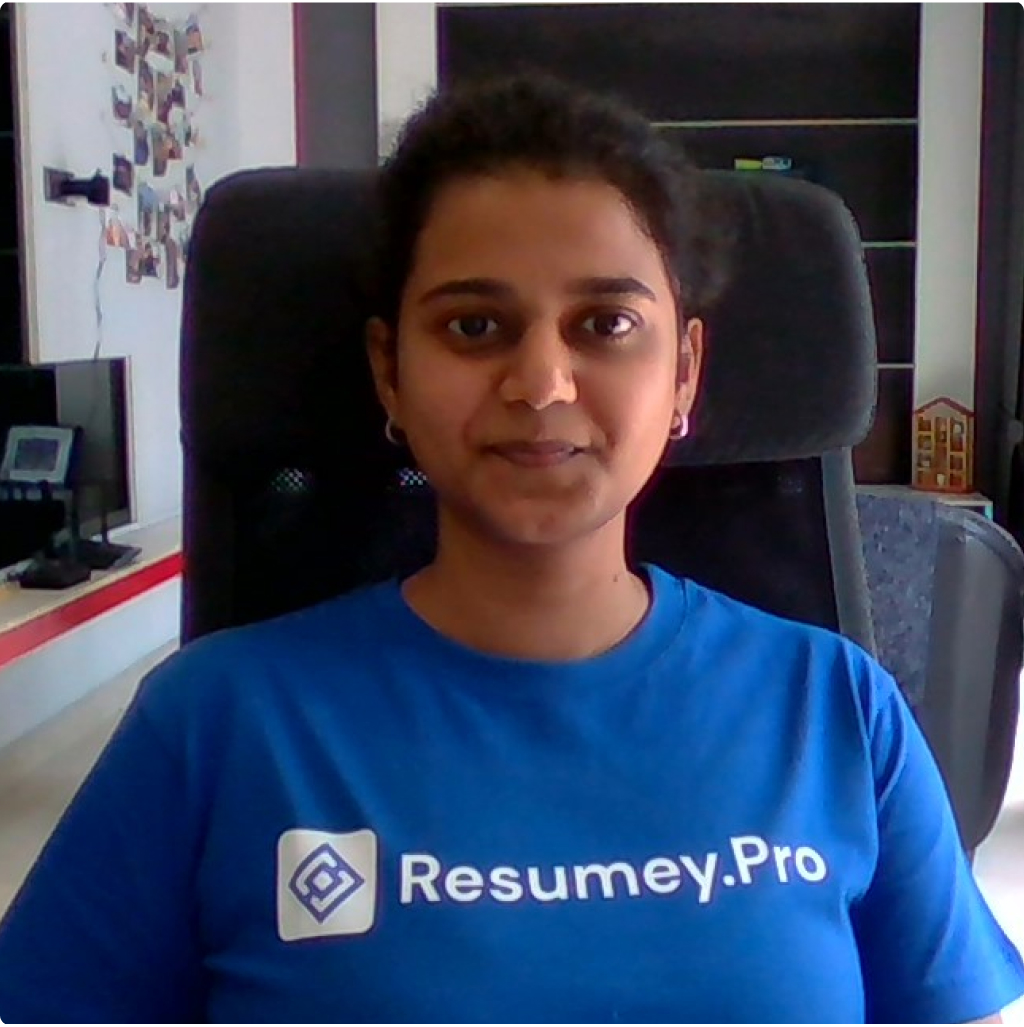Most people think the skills section of a resume is just a list. And they’re right, but only partially.
What actually convinces a hiring manager isn’t the word “Python” or “Leadership” typed neatly in a column. It’s what those words mean in context.
Your resume should balance two layers of skills:
-
Keywords in the skills section (so you pass ATS filters).
-
Proof in your bullet points (so you stand out to a human).
Let’s break this down.
Skills for a resume: why just keywords aren’t enough
The skills section is often just a block of keywords: Excel, Project Management, Communication.
It helps, but only in one way: matching the job description.
The real weight sits in your work experience bullets. That’s where you connect the dots:
-
Excel→ “Built automated dashboards cutting reporting time by 40%.” -
Project Management→ “Led a cross-functional team of 8 to deliver a $2M project ahead of schedule.”
So, keep the skills section lean and keyword-rich. Save the storytelling for your bullet points.
💡 Related read: resume summary examples — another place where skills come alive with context.
Skills for a resume that actually show impact
When recruiters scan your resume, they’re looking for quick proof of fit. And the skills section is one of the fastest ways to see it. The right skills tell them three things:
- You have the technical foundation for the role.
- You bring something unique to the table.
- You show transferable strengths that work across industries.
Most job seekers only cover one of these. The strongest resumes cover all three.
The three types of skills for a resume
Think of resume skills as three layers. Miss one, and your application feels incomplete.
1. Foundational skills
These are the hard skills for a resume. The non-negotiables tied directly to the job.
Examples:
- SQL, Python, Tableau (for analysts)
- Salesforce, HubSpot, cold outreach (for sales)
- GAAP, QuickBooks, payroll (for accounting)
If you skip these, you don’t even make the first cut.
2. Differentiating skills
These are the best skills for a resume because they set you apart from everyone else with the same basics.
Examples:
- Knowing TikTok Ads Manager (not just Google Ads)
- Mastering accessibility compliance (not just JavaScript)
- Automating CRM workflows (not just using CRM)
Differentiating skills make a recruiter think, this candidate brings more value than others.
3. Transferable skills
These are the good skills for a resume because they make you adaptable across industries.
Think leadership, communication, problem-solving, critical thinking.
But don’t just drop the words. Back them up with proof in your resume.
For example, mention the relevant proof in your experience section:
Led a 5-person team through a migration project, delivering 2 weeks early.
This is the difference between generic and authentic skills.
A small trick to highlight skills visually
On Resumey.Pro, you can wrap your skills in backticks `` to highlight them in color.
Instead of this:
Python, MySQL, Technical Leadership
You get this:
 Use backticks (``) in Resumey.Pro to highlight your skills in color and make them instantly stand out.
Use backticks (``) in Resumey.Pro to highlight your skills in color and make them instantly stand out.
It’s a subtle, recruiter-friendly way to make your skills pop, without adding clutter.
Skills for a resume examples: keywords + bullet points
Instead of just listing, show them across both sections:
In the skills section (keywords): Python, SQL, Data Visualization, Project Management, Leadership
In work experience (proof): “Developed backend APIs in Python, reducing system load by 30%”
“Used SQL to optimize queries, saving hours in daily processing time”
“Led a team of 5 analysts to deliver insights that shaped product strategy”
That’s what turns skills into evidence.
Resume skills by role
Different roles demand different skills. Here are some skills for a resume examples:
Technical skills for a resume
Technical skills are your foundation — the first filter most recruiters look for. List them cleanly in the skills section.
But whenever possible, back them up with proof in your experience section:
“AWS” → “Migrated infrastructure to AWS, cutting hosting costs by 25%.”
“Figma” → “Designed and prototyped new onboarding flow in Figma, boosting sign-ups by 18%.”
This mix of keyword + context is gold.
Work skills for a resume (by role)
Some roles demand very specific emphasis. Here are some examples of skills for a resume that you can use:
-
Skills for a sales resume:
Negotiation,CRM,Persuasion,Relationship-building -
Leadership skills for a resume:
Team management,Conflict resolution,Strategic planning -
Skills for a manager resume:
Budgeting,Stakeholder management,Delegation,Coaching
List the keywords in your skills section. Then show outcomes in your bullets.
Best skills for a resume vs good skills for a resume
Here's the difference between the two:
Good skills = baseline competencies. Everyone has them.
Best skills = differentiators that set you apart.
Example:
- Good skill: “Excel”
- Best skill: “Excel VBA automation”
Recruiters want both. But it’s the best skills that make you memorable.
Key skills for a resume that recruiters actually care about
Recruiters don’t care about every skill you list. They care about the ones that:
- Match the job description.
- Have measurable outcomes.
- Show how you’ll deliver results.
That’s what turns key skills for a resume into job offers.
Job skills for a resume: how to choose the right ones
What skill should I put on my resume?
Here’s the simplest rule: start with the job description.
If it mentions Agile, Jira, and stakeholder management, those are your job skills for a resume.
Relevance beats completeness. Always.
Hard skills for a resume vs soft skills
A strong resume balances both:
- Hard skills for a resume → measurable, technical abilities (SQL, budgeting, CAD).
- Soft skills → interpersonal, less tangible (leadership, communication, adaptability).
How many skills should you list on a resume?
8–12. That’s the sweet spot.
The framework:
✅ 3–4 hard skills
✅ 2–3 soft or leadership skills
✅ 2–3 transferable skills
More than that looks scattered. Less than that looks underqualified.
Just like you wouldn’t list every acquaintance as a reference, you also shouldn’t overload your resume with every skill you have.
Here’s a guide on how to list references on resumes without overdoing it.
Final takeaway: make your skills proof, not filler
Anyone can dump a list of skills on a resume. Few people know how to pick the right ones and frame them with proof.
When your skills act as signals and not filler, your resume stops blending in and starts standing out.
So:
- Keywords in the skills section → ATS sees you.
- Proof in your bullet points → Humans hire you.
Your skills section may be short, but it’s never just a list. It’s the entry point to a bigger story.
